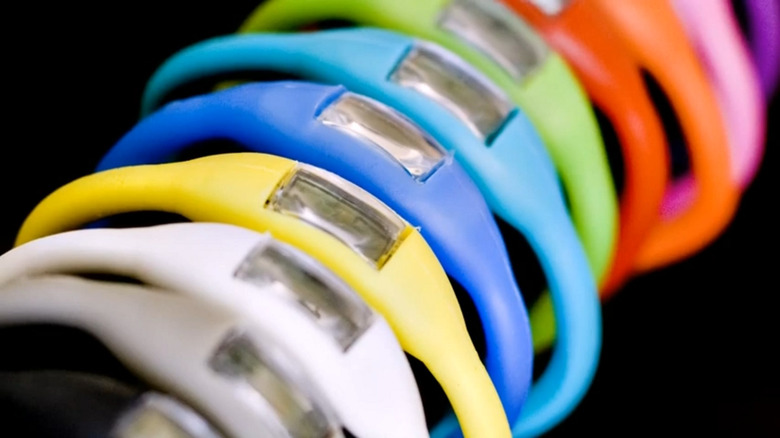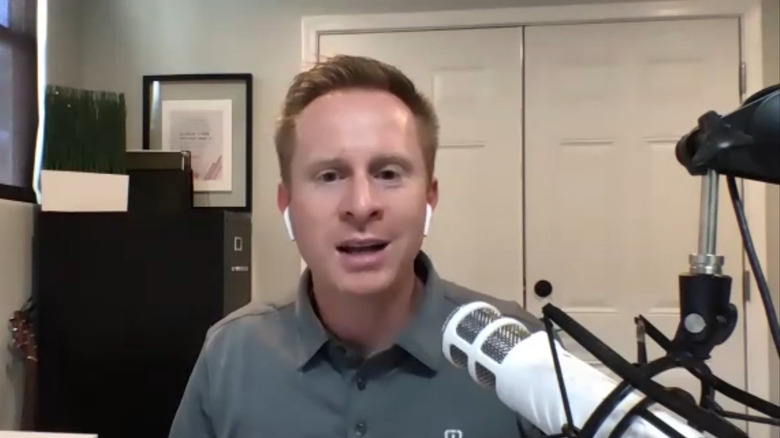What Happened To Esso Watches After Shark Tank?
In this ever-evolving world, it's hard to have a moment where we're not surrounded by technology. Initially, everybody believed this phenomenon was positive because it meant our loved ones were never that far away. But over the years, we've come to understand that technology doesn't come without caveats. Something as instinctive as placing your laptop on your lap can cause bodily problems, while something as ordinary as a cell phone can be bad for your health in more ways than you can imagine.
But with our reliance on technology, most of us can't walk away, and many entrepreneurs recognize that, so they seek to create products that protect us from the harmful effects of technology. And in 2012, entrepreneur Ryan Naylor introduced Esso Watches on "Shark Tank" as an innovative way to battle technological woes. According to their marketing, many devices like cell phones and lights have positive ions, and when we come into contact with them, these positive ions make their way into our bodies.
This causes an imbalance in ion levels, which prevents us from functioning optimally. Esso Watches attract negative ions to help restore equilibrium to our bodies, which in turn, helps to prevent imbalance, fatigue, and lack of coordination and concentration. It was a sleek, stylish, and water-resistant silicone watch with several color options. And like many other seemingly scientific products, Esso Watches had a tough time in the tank. In fact, it was one of the many gadgets that Mark Cuban labeled a scam.
Esso Watches walked away without a deal
Ryan Naylor asked for $35,000 in exchange for a 20% stake in his business, a $175,000 valuation. Naylor claimed to have sold $120,000 in watches in one month from just a $10,000 investment and earned $70,000 in profits. He boasted that the company's marketing spend was zero because he used his expertise in Search Engine Optimization to help the product naturally rank high in the results.
Naturally, many sharks felt skeptical about the product's claims, so Naylor called upon Lori Greiner to put the Esso Watch to the test. She tried balancing on one leg with and without the watch and found a noticeable improvement with the watch. When Naylor was handing out product samples to the Sharks, Mark Cuban refused to take one despite Naylor's plea that the watch was Maverick's blue. Robert Herjavec asked Cuban if he was allergic to the ions, and Cuban replied, "I am allergic to scams." Cuban also argued that the technology was dated, disproven, and only created a placebo effect, so he backed out.
The Esso watch had no accreditations from independent laboratory testing, so Greiner also turned Naylor down because the inventor had no way to prove his claims. Daymond John accused Esso watches of having a similar design to his investment, RumbaTime, and bowed out too. Kevin O'Leary was the only shark who seemed interested, and Cuban jokingly threatened to beat him up if he invested. But O'Leary would only make a deal if Naylor agreed that the product was a scam, which he denied.
Ryan Naylor's Shark Tank appearance was a formative experience for him
In an episode of "The What Would U Ask" podcast, Ryan Naylor got candid about his experience on "Shark Tank." Naylor revealed that he didn't apply to be on the show but received an invitation to pitch. He claimed that before his appearance, the producers told him to center his pitch around the ions because they wanted him to appear slightly unhinged. Naylor acknowledged that he didn't have complete conviction in the Esso watch's health-related claims either, but many of his customers felt the improvement.
Despite the Sharks' negative comments throughout his pitch, Naylor managed to keep his cool because he felt like the whole thing was a set-up to earn better ratings for "Shark Tank" since it was on the verge of cancellation at the time. Naylor revealed that he initially did the balance test with Kevin O'Leary but felt he was only attempting to ridicule the product, and when Naylor stood up for himself, Lori Greiner did a genuine test.
According to Naylor, the Sharks solely focused on disproving the Esso watch's health claims instead of listening to his vision. The entrepreneur even said that after the episode aired, his website crashed due to excessive traffic. He got a call from the founder of UPS, who said that he believed in Naylor as a person and would invest in him. He also warmly recalled that Barbara Corcoran invited him to grab a meal when he was in New York, and it helped him push through the negativity and hate.
Is Esso Watches still in business?
As you can imagine, Ryan Naylor received an onslaught of negative comments after his "Shark Tank" episode. In the podcast interview, he discussed how people invaded his privacy and found his phone number, office address, and email to send him despicable messages. Some even left negative comments on his wife's blog post to get it taken down. Naylor added that he wished Mark Cuban had chosen his words more carefully because he labeled Naylor as a scam artist, and people latched onto that and sent him hate.
Naylor also confirmed that four lawsuits were filed against him after the show aired. Three of them sued him for health damages from Esso watches, but they were easily disproven because the product hadn't been shipped to the complainants due to low inventory. Naylor simply called the attorneys and told them the suit was baseless, and they dropped the suits. But the fourth caused the company's downfall. Exxon Mobil filed a lawsuit against Esso Watches because they owned the "Esso" trademark.
Naylor said they tried to fight the lawsuit by using their profits to fund the legal expenses because the company name was based on the Italian phrase "Esso," and his products were miles apart from Exxon Mobil's. But eventually, he decided to give up the fight and shut down the company instead. Since then, Naylor has channeled his entrepreneurial experience into developing VIVAHR, recruiting software that streamlines employment for businesses with greater customization and an analytical approach.



